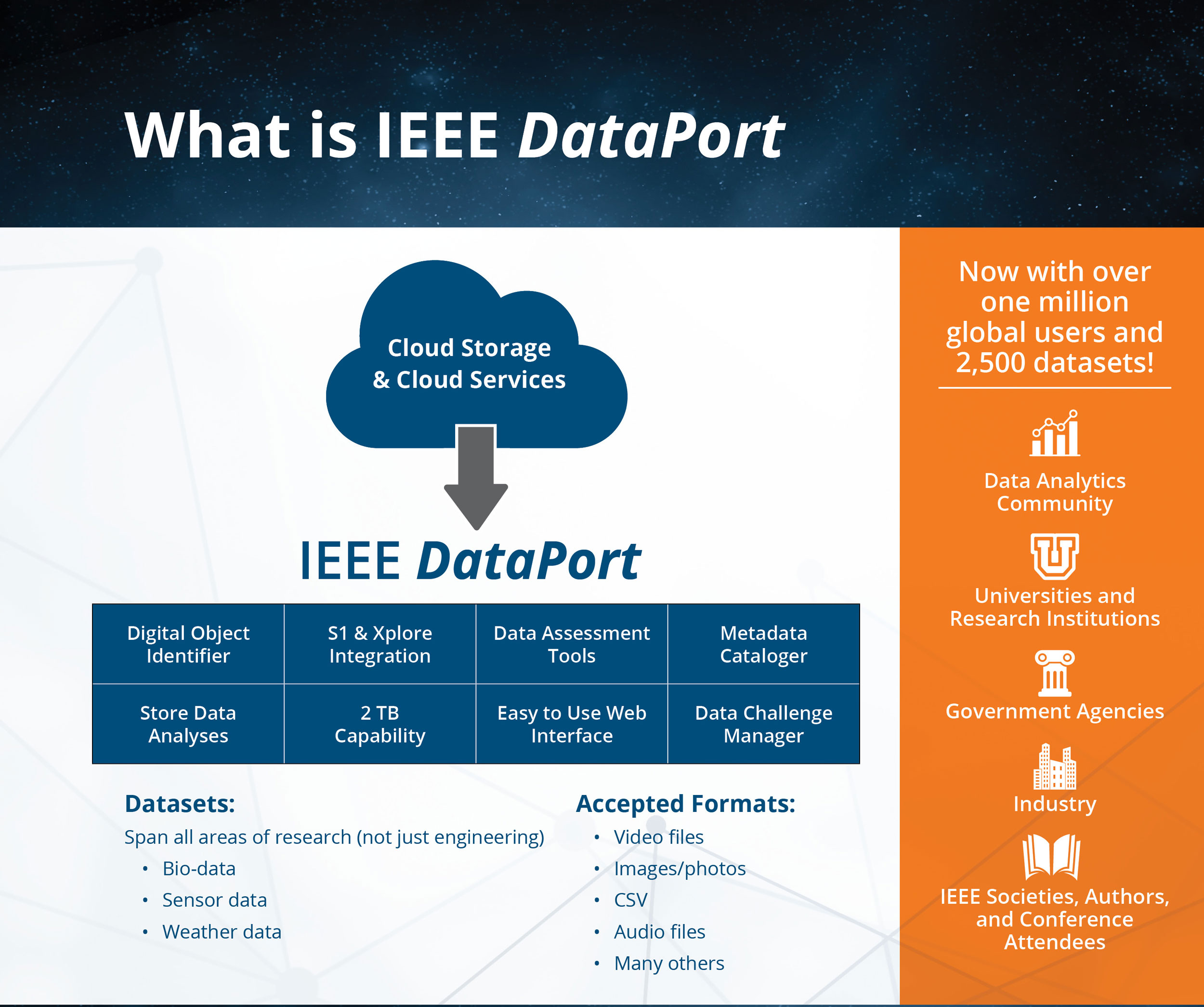With a mission of fostering technological innovation and excellence for the benefit of humanity, IEEE, the world’s largest technical professional organization, is a global community of over 400,000 technology and engineering professionals. IEEE has over 30 Societies including Engineering in Medicine and Biology, Professional Communication, Computational Intelligence, and Robotics and Automation. IEEE leads many important conversations about today’s most relevant technical topics, on both a local and global scale, and actively participates in research and authorship, cutting-edge conferences, the advancement of STEM education, and the development of industry standards. In 2016, IEEE introduced IEEE DataPort to further support these activities and provide a full-service data platform to meet the growing data needs of the global technical community.

Meeting Institutions’ Growing Data Needs
IEEE DataPort is a universally accessible data research platform that allows researchers and engineers in various disciplines to store, share, and manage datasets. Through this collective source of contributed data, the platform looks to expand the opportunities for analysis, replication, and verification of research findings. “As research in nearly all technical domains becomes more data intensive, Edge looks for new ways to provide its customers with improved access to more, high-quality data, as well as greater networking and computing opportunities,” says Dr. Forough Ghahramani, Edge’s Associate Vice President for Research, Innovation and Sponsored Programs. “Edge, in partnership with IEEE, wants to help institutions gain global exposure for their research and have new avenues for scientific collaboration and innovation. As a full-service data platform, IEEE DataPort is designed to help organizations take their science initiatives to the next level.”
Noted Dr. David Belanger, Chair, IEEE DataPort Project, “IEEE is pleased to have the opportunity to work with Edge in bringing IEEE DataPort to researchers and institutions. IEEE and Edge both understand the critical need of the research community for replication and extension of data intensive studies, to meet funding agency requirements, and for a secure platform on which to store, manage, and provide accessibility to research data. IEEE DataPort is a full-service data platform that can serve all researchers and all institutions and help them meet the requirements for managing research data.”
WHY IEEE DATAPORT?
Store, search, and access standard or Open Access datasets up to 2TB.
ACCESS DATASETS
Login for freely available Open Access datasets or subscribe for full access.
SUBMIT A DATASET
Storing and sharing your datasets on IEEE DataPort is completely free.
GET UPDATES
Get the latest Datasets and insights delivered to your inbox.
“IEEE is pleased to have the opportunity to work with Edge in bringing IEEE DataPort to researchers and institutions. IEEE and Edge both understand the critical need of the research community for replication and extension of data intensive studies, to meet funding agency requirements, and for a secure platform on which to store, manage and provide accessibility to research data. IEEE DataPort is a full-service data platform that can serve all researchers and all institutions and help them meet the requirements for managing research data.”
— Dr. David Belanger
Chair, IEEE DataPort Project

Fostering Research Collaboration
Currently IEEE DataPort has over one million unique users, more than 2,500 datasets, and over 60,000 website visits in January 2021. “Edge has a substantial overlap in technical domains of interest with IEEE, and has far-reaching relationships with research organizations in the northeast U.S.—and through connections to its sibling organizations—across North America,” explains Ghahramani. “The Edge and IEEE partnership will result in more users, more data sets, and more interesting and valuable research shared among technical experts across the world.”
Institutions can upload a dataset and any supporting documentation, up to 10TB each, to IEEE DataPort, not only exposing their work to fellow researchers and the global technical community, but helping institutions to gather feedback and citations for their research. If an organization is seeking information to support their research, they can search for data on the platform, download datasets directly or securely access data from the Cloud. The platform also helps institutions meet funding agency requirements for open data and research reproducibility.
Promoting Global Exposure of Institutional Research
An IEEE DataPort Institutional Subscription provides organization-wide benefits and allows all members to store, share, access, and manage research data. Each member has unlimited access to all datasets hosted on IEEE DataPort, the ability to consolidate their institution’s research data in a single location, and track organizational usage through a custom dashboard. An institution can host data in any format, including video, audio, and image files. In addition, datasets can be branded with a logo to increase the recognition and exposure of the valuable research led by an institution. Edge and IEEE are dedicated to finding new and exemplary ways to foster collaboration within the research community. IEEE DataPort allows researchers to harness the power of data sharing and join forces with other pioneers to collectively accelerate scientific discovery and innovation.
Learn more about IEEE DataPort and connecting your organization with the largest growing technical community in the world. Contact Edge at ieeedataport@njedge.net to determine which subscription model will best suit your institution’s needs.
A full-service platform to meet your institution’s growing data needs
Global Exposure
Join Data Communities
Support Research Reproducibility
Publish Research Data
Meet Funding Agency Requirements
Store Datasets up to 2TB Each
Share Data and Get Feedback
Access Other Research Datasets
More Citations
Initiate Date Competitions
Open Access Options
Consolidate Your Organization’s Research


